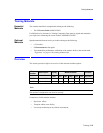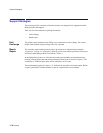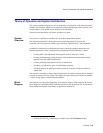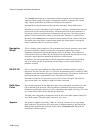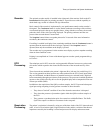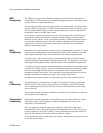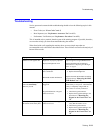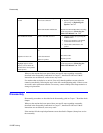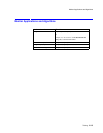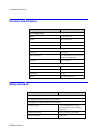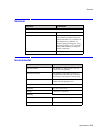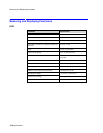
Troubleshooting
Training
11-11
Troubleshooting
Service personnel concerned with troubleshooting should review the following topics in this
manual:
• Error Codes (see “Error Codes” on 6-3)
• Boot Sequence (see “Performance Assurance Test” on 4-11)
• Performance Verification (see “Performance Procedures” on 4-22)
This is intended to be a practical, hands-on part of the training program. If possible, therefore,
use a monitor to help you learn about troubleshooting the monitor.
When faced with a call regarding the monitor, there are some simple steps that are
recommended to solve the failures described below. These failures account for the majority of
known failure modes.
Symptom Cause of Failure Remedy
Monitor screen appears dim Brightness not properly adjusted.
Display backlight tube worn.
Adjust brightness using Contrast button.
Replace backlight tube according to
instructions in “Replacing the Backlight
Tube” on page 9.
Monitor screen is blank Display backlight tube worn or
loose connection.
Main PCB module malfunction.
1. Check the backlight tube connector
2. Replace the backlight tube
Replace the Main PCB module according
to instructions in
“Removing the Main
PCB Module” on 7-12
.
Monitor fails to power-up
when the On/Standby
button is pressed.
Battery is dead or monitor is not
plugged in.
Keypad malfunction or keypad
connector is loose.
Make sure the monitor is powered on by
either battery or AC power. Check that the
battery is adequately charged and AC
power fuses are securely connected.
1. Check the keypad connector.
2. Replace the keypad according to the
instructions in
“Removing the
Keypad on the Front Panel” on
7-6
.
No response when pressing
the buttons on the front panel
Keypad malfunction or keypad
connector is loose.
1. If only one button does not work,
verify that the monitor is On.
2. Check the keypad connector
3. Replace the keypad according to the
instructions in
“Removing the
Keypad on the Front Panel” on
7-6
.



